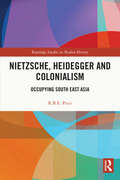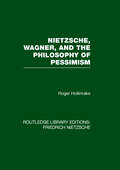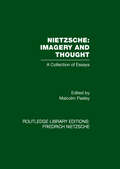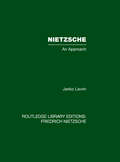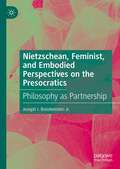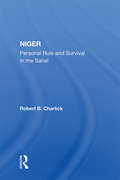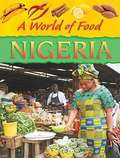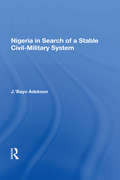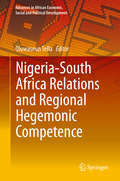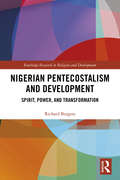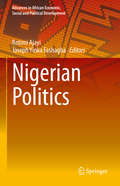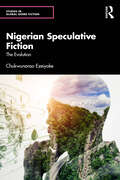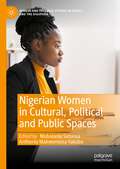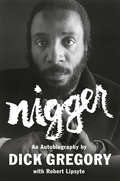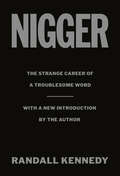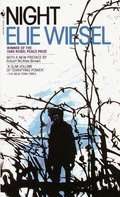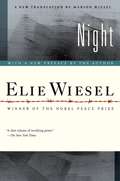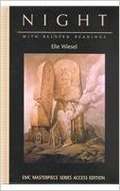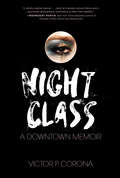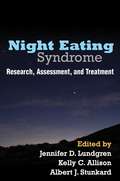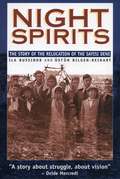- Table View
- List View
Nietzsche, Heidegger and Colonialism: Occupying South East Asia (Routledge Studies in Modern History #85)
by R.B.E. PriceThis text argues that Nietzsche’s idea of invalid policy that is believed to be valid and Heidegger’s concept of doubt as the reason for a representation are essentially the same idea. Using this insight, the text investigates vignettes from colonial occupation in Southeast Asia and its protest occupations to contend that untruth, covered in camouflages of constancy and morality, has been a powerful force in Asian history. The Nietzschean inflections applied here include Superhumanity, the eternal return of trauma, the critiques of morality, and the moralisation of guilt. Many ideas from the Heideggerian canon are used, including the struggle for individual validity amidst the debasement and imbalance of Being. Concepts such as thrownness, finitude and the remnant cultural power of Christianity, are also deployed in an exposé of colonial practices. The book gives detailed treatment to post-colonial Malaya (1963), Japanese occupied Hong Kong (1941–1945), and the tussle with communism in Cold War Singapore and Malaya, as well as the question of Kuomintang KMT validity in Hong Kong (1945–1949) and British Malaya (1950– 1953). The book explains the struggles for identity in the Hong Kong protest movement (2014–2020) by showing how economic distortion caused by landlordism has been covered by aspirations for freedom.
Nietzsche, Wagner and the Philosophy of Pessimism (Rouledge Library Editions: Friedrich Nietzsche)
by Roger HollinrakeNietzsche’s relationship with Wagner has long been a source of controversy and has given rise to a number of important studies, including this major breakthrough in Nietzsche scholarship, first published in 1982. In this work Hollinrake contends that the nature and extent of the anti-Wagnerian pastiche and polemic in Thus Spake Zarathustra is arguably the most important factor in the association between the two. Thus Wagner, as the purveyor of a particular brand of Schopenhauerian pessimism, is here revealed as one of the principle sources – and targets – of Zarathustra. Whilst addressed primarily to students of German Literature, this book will also be of interest to musicians, philosophers and students of the history of culture and ideas.
Nietzsche: 'On the Genealogy of Morality'
by Friedrich Nietzsche Keith Ansell-Pearson Carol DietheFriedrich Nietzsche is one of the most influential thinkers of the past 150 years and On the Genealogy of Morality (1887) is his most important work on ethics and politics. A polemical contribution to moral and political theory, it offers a critique of moral values and traces the historical evolution of concepts such as guilt, conscience, responsibility, law and justice. This is a revised and updated 2006 edition of one of the most successful volumes to appear in Cambridge Texts in the History of Political Thought. Keith Ansell-Pearson modified his introduction to Nietzsche's classic text, and Carol Diethe incorporated a number of changes to the translation itself, reflecting the considerable advances in our understanding of Nietzsche. In this guise the Cambridge Texts edition of Nietzsche's Genealogy should continue to enjoy widespread adoption, at both undergraduate and graduate level.
Nietzsche: A Collection of Essays
by Malcolm PasleyThe central theme of this collection of essays, first published in 1978, is the basic tension in Nietzsche, and so in his work, between the urge to weave a satisfying web out of reality and the equally strong compulsion to expose its painful truths. The book aims to stress, not to play down, the embarassing and fruitful fact that he cannot be neatly pigeonholed either as a literary figure or as a professional philosopher. The book meets a long-felt need for a study in English of both the literary and the philosophical aspects of Nietzsche's work, based on his authentic texts, and will be welcomed by all students of modern European thought and Literature.
Nietzsche: An Approach (Routledge Library Editions: Friedrich Nietzsche)
by Janko LavrinJanko Lavrin's influential biography of Friedrich Nietzsche, originally published in 1948, analyses the bond between Nietzsche's personal fate on the one hand and the trend of his thought on the other, set against the background of contemporary crisis typical of mankind in general.
Nietzsche: On the Geneaology of Morality and Other Writings (Cambridge Texts in the History of Political Thought #Third Edition)
by Friedrich Nietzsche Keith Carol Diethe Ansell-PearsonFriedrich Nietzsche is one of the most influential thinkers of the past 150 years and On the Genealogy of Morality (1887) is his most important work on ethics and politics. A polemical contribution to moral and political theory, it offers a critique of moral values and traces the historical evolution of concepts such as guilt, conscience, responsibility, law and justice. This is a revised and updated 2006 edition of one of the most successful volumes to appear in Cambridge Texts in the History of Political Thought. Keith Ansell-Pearson modified his introduction to Nietzsche's classic text, and Carol Diethe incorporated a number of changes to the translation itself, reflecting the considerable advances in our understanding of Nietzsche. In this guise the Cambridge Texts edition of Nietzsche's Genealogy should continue to enjoy widespread adoption, at both undergraduate and graduate level.
Nietzschean, Feminist, and Embodied Perspectives on the Presocratics: Philosophy as Partnership
by Joseph I. Breidenstein Jr.This book is the first sustained scholarly account of women and goddesses in presocratic philosophy. It approaches the origin of western philosophy via Nietzsche, Feminism, and Embodied Cognition in order to argue that the presocratics were reviving, within the largely patriarchal and death-glorifying culture of archaic Greece, a paleo/neolithic goddess-centered religiosity that affirmed life and rebirth. By taking readers from prehistoric Europe to classical Athens, Joseph I. Breidenstein Jr. provides a novel narrative of the dawn of western philosophy which is more comprehensive than traditional accounts and which helps us address contemporary problems—the patriarchal attitudes and ideas that continue to corrupt academic-philosophical culture; the fascist-dominator lifestyle that continues to threaten western democracy and which is encouraged by the patriarchal aspects of academia; and the consumerism that continues to result from a materialistic-secular paradigm that is being increasingly recognized as both intellectually untenable and socially unsustainable.
Niger: Personal Rule And Survival In The Sahel
by Robert B CharlickNiger, a landlocked former French colony in the heart of west Africa, is a rich ensemble of African societies struggling to survive as a new nation in one of the world's most difficult ecological regions-the Sahel. Dr, Charlick sketches the emergence and history of Niger, showing how its component societies were influenced by changes in the physica
Niger: Poverty Reduction Strategy Paper Progress Report
by International Monetary FundA report from the International Monetary Fund.
Nigeria In Search Of A Stable Civil-military System
by J. ’Bayo AdeksonThis book is a critical study of the evolution and conduct of military government as well as civil-military relations in Nigeria since 1970, examining the essentially military clauses of both the draft and final Constitution drawn up for post-1979 Nigeria.
Nigeria-South Africa Relations and Regional Hegemonic Competence (Advances in African Economic, Social and Political Development)
by Oluwaseun TellaThis book examines the relations between Nigeria and South Africa and their implications for regional influence across the African continent. With the largest and third largest economies in the region and a historical status as the major peacemakers on the continent, it is often argued that Africa’s fate is directly linked to the success or failure of these regional powers. While there is widespread reference to each state’s capabilities and regional influence in the extant literature, little analysis is offered on relations between Nigeria and South Africa and their impact on regional governance and provision of public goods on the continent. This book attempts to fill the gap by engaging issues such as the hegemonic competence of the states, their credentials for a permanent seat at the UNSC, their efforts towards regional integration, and their efforts towards combating the dark side of globalization including climate change, drug trafficking and xenophobia. It also engages a gender perspective to these states’ relations as well as their experiences of transitional justice. Providing an in-depth comparative analysis of the two so called African powerhouses, this volume will be of interest to policy-makers, academics and students interested in Nigeria and South Africa’s foreign policy, regional powerhood, and the African peace, security, and development agenda.
Nigerian Pentecostalism and Development: Spirit, Power, and Transformation (Routledge Research in Religion and Development)
by Richard BurgessThis book examines the contributions, both intentional and unintentional, of Nigerian Pentecostal churches and NGOs to development, studying their development practices broadly in relation to the intersecting spheres of politics, economics, health, education, human rights, and peacebuilding. In sub-Saharan Africa, Pentecostalism is fast becoming the dominant expression of Christianity, but while the growth and civic engagement of these churches has been well documented, their role in development has received less attention. The Nigerian Pentecostal landscape is one of the most vibrant in Africa. Churches are increasingly assuming more prominent roles as they seek to address the social and moral ills of contemporary society, often in fierce competition with Islam for dominance in Nigerian public space. Some scholars suggest that the combination of an enchanted worldview, an emphasis on miracles and prosperity teaching, and a preoccupation with evangelism discourages effective political engagement and militates against development. However, Nigerian Pentecostalism and Development argues that there is an emerging movement within contemporary Nigerian Pentecostalism which is becoming increasingly active in development practices. This book goes on to explore the increasingly transnational approach that churches take, often seeking to build multicultural congregations around the globe, for instance in Britain and the United States. Nigerian Pentecostalism and Development: Spirit, Power, and Transformation will be of considerable interest to scholars and students concerned with the intersection between religion and development, and to development practitioners and policy-makers working in the region.
Nigerian Politics (Advances in African Economic, Social and Political Development)
by Joseph Yinka Fashagba Rotimi AjayiThis volume engages in an in-depth discussion of Nigerian politics. Written by an expert group of Nigerian researchers, the chapters provide an overarching, Afrocentric view of politics in Nigeria, from pre-colonial history to the current federal system. The book begins with a series of historical chapters analyzing the development of Nigeria from its traditional political institutions through the First Republic. After establishing the necessary historical context, the next few chapters shift the focus to specific political institutions and phenomena, including the National Assembly, local government and governance, party politics, and federalism. The remaining chapters discuss issues that continue to affect Nigerian politics: the debt crisis, oil politics in the Niger Delta, military intervention and civil-military relations, as well as nationalism and inter-group relations. Providing an overview of Nigerian politics that encompasses history, economics, and public administration, this volume will be useful to students and researchers interested in African politics, African studies, democracy, development, history, and legislative studies.
Nigerian Speculative Fiction: The Evolution (Studies in Global Genre Fiction)
by Chukwunonso EzeiyokeThis book is an exciting addition to a gap in non-Western genre studies of African fiction. It challenges the dominant canonicity of African literature, which is overshadowed by texts concerned with the colonial discourse and ‘writing back’ while exploring speculative themes in Nigerian fiction and writing that stem from an African cosmology and culture.The book examines important twentieth-century precursors of the post-millennial ‘boom’ in Nigerian Speculative Fiction (SF), reading texts that were omitted from the Nigerian literary canon developed in the 1960s. It combines an analysis of recent fiction and criticism with a historical overview of the development of the under-researched area of Nigerian SF. Through these readings, the author demonstrates the range of concerns explored by Nigerian SF including futurism, posthumanism, horror, fantasy, and science fiction, among others. This book argues that these narratives exceed the binary implicitly sustained by the texts that write back to the West and o-ers new readings of contemporary Nigerian SF; works that imagine futures di-erent from the past and present conditions imposed by capitalism, colonialism, and imperialism.Providing new theoretical tools and concepts, this book in the Studies in Global Genre Fiction series will be of interest to readers and scholars working in the fields of African studies, African culture and society, literature and language, interdisciplinary literary studies, area studies, literary criticism, and genre studies.
Nigerian Women in Cultural, Political and Public Spaces (Gender and Cultural Studies in Africa and the Diaspora)
by Mobolanle Sotunsa Anthonia Makwemoisa YakubuThis book will provide empirical engagements of African women in the private and public spaces and their adaptations, alterations and and integration of the private and public spaces. This approach is contrary to most existing studies which may not necessarily provide contextual and empirical evidences of the debates about the spaces of women or interrogate both the private and public spaces in a single volume. This book will offer a novel insight into gender and power dynamics, especially as it relates to the cultural spaces, private spaces and public spaces which African women occupy and subjugate. The fourteen papers in this book critically examine the African women in different positions within the private and public spaces, the strong inhibiting presence of patriarchy, and the resistance women display to empower themselves.
Nigger: An Autobiography
by Robert Lipsyte Dick GregoryComedian and civil rights activist Dick Gregory’s million-copy-plus bestselling memoir—now in trade paperback for the first time.“Powerful and ugly and beautiful...a moving story of a man who deeply wants a world without malice and hate and is doing something about it.”—The New York TimesFifty-five years ago, in 1964, an incredibly honest and revealing memoir by one of the America's best-loved comedians and activists, Dick Gregory, was published. With a shocking title and breathtaking writing, Dick Gregory defined a genre and changed the way race was discussed in America.Telling stories that range from his hardscrabble childhood in St. Louis to his pioneering early days as a comedian to his indefatigable activism alongside Medgar Evers and Dr. Martin Luther King, Jr., Gregory's memoir riveted readers in the sixties. In the years and decades to come, the stories and lessons became more relevant than ever, and the book attained the status of a classic. The book has sold over a million copies and become core text about race relations and civil rights, continuing to inspire readers everywhere with Dick Gregory's incredible story about triumphing over racism and poverty to become an American legend.
Nigger: The Strange Career of a Troublesome Word - with a New Introduction by the Author
by Randall KennedyThe twentieth anniversary edition of one of the most controversial books ever published on race and language is now more relevant than ever in this season of racial reckoning.In addition to a brave and bracing inquiry into the origins, uses, and impact of the infamous word, this edition features an extensive new introduction that addresses major developments in its evolution during the last two decades of its vexed history.In the new introduction to his classic work, Kennedy questions the claim that &“nigger&” is the most tabooed term in the American language, faced with the implacable prevalence of its old-fashioned anti-Black sense. &“Nigger&” continues to be part of the loud soundtrack of the worst instances of racial aggression in American life—racially motivated assaults and murders, arson, intentional infliction of emotional distress, and workplace harassment.Consider this: twenty years ago, Kennedy wrote that any major politician credibly accused of using &“nigger&” would be immediately abandoned and ostracized. He was wrong. Donald Trump, former POTUS himself, was credibly charged, and the allegation caused little more than a yawn. No one doubted the accuracy of the claim but amidst all his other racist acts his &“nigger-baiting&” no longer seemed shocking. &“Nigger&” is still very much alive and all too widely accepted. On the other hand, Kennedy is concerned to address the many episodes in which people have been punished for quoting, enunciating, or saying &“nigger&” in circumstances that should have made it clear that the speakers were doing nothing wrong—or at least nothing sufficiently wrong to merit the extent of the denunciation they suffered.He discusses, for example, the inquisition of Bill Maher (and his pathetic apology) and the (white) teachers who have been disciplined for reading out loud texts that contain &“nigger.&” He argues that in assessing these controversies, we ought to be more careful about the use/mention distinction: menacingly calling someone a &“nigger&” is wholly different than quoting a sentence from a text by James Baldwin or Toni Morrison or Flannery O&’Connor or Mark Twain. Kennedy argues against the proposition that different rules should apply depending upon the race of the speaker of &“nigger,&” offering stunningly commonsensical reasons for abjuring the erection of such boundaries. He concludes by venturing a forecast about the likely status of &“nigger&” in American culture during the next twenty years when we will see the clear ascendance of a so-called &“minority majority&” body politic—which term itself is redolent of white supremacy.
Night
by Elie Wiesel Stella RodwayWhen Elie Wiesel was liberated from Buchenwald in 1945, having also been in Birkenau, Auschwitz, and Buna, he imposed a ten-year vow of silence upon himself before trying to describe what had happened to him and over six million other Jews. When he finally broke that silence, he had trouble finding a publisher. Such depressing subject matter. When Night was finally published, over twenty-five years ago, few people wanted to read about the Holocaust. Such depressing subject matter. But we cannot indefinitely avoid depressing subject matter, particularly if it is true, and in the subsequent quarter century the world has had to hear a story it would have preferred not to hear-the story of how a cultured people turned to genocide, and how the rest of the world, also composed of cultured people, remained silent in the face of genocide.
Night
by Elie Wiesel Marion WieselA new translation of Wiesel's landmark book Night, and the text of his 1986 Nobel Peace Prize Acceptance Speech.
Night (With Related Readings)
by Elie WieselAn autobiographical narrative in which the author describes his experiences in Nazi concentration camps, watching family and friends die, and how these experiences led him to believe that God is dead.
Night Class: A Downtown Memoir
by Victor CoronaThe playground of the rich and the beautiful, downtown New York's nightlife spectacles and power of self-invention incubated pop icons from Andy Warhol to Lady Gaga. NYU sociologist Victor P. Corona sought a new education, where night classes held in galleries, nightclubs, bars, apartments, stoops, and all-night diners taught him about love, loss, and the living possibilities of identity. Transforming himself from dowdy professor to glitzy clubgoer, Victor immerses himself among downtown's dazzling tribes of artists and performers hungry for fame.Night Class: A Downtown Memoir investigates the glamour of New York nightlife. In interviews and outings with clubland revelers and influencers, including Party Monster and convicted killer Michael Alig, Night Class exposes downtown's perilous trappings of drugs, ambition, and power. From closeted, undocumented Mexican boy to Ivy League graduate to nightlife writer, Corona shares in Night Class the thrill and tragedy of downtown and how dramatically identities can change.
Night Eating Syndrome
by Kelly C. Allison Jennifer LundgrenIn one indispensable volume, this book combines a complete overview of night eating syndrome (NES) with evidence-based treatment guidelines and clinical tools. Experts in the field review the biological underpinnings of NES and its common comorbidities; explain how the basic science can inform clinical practice; and discuss issues in assessment and diagnosis. Vivid case examples are featured. Of special utility for clinicians, the book includes a manual for delivering an empirically supported cognitive-behavioral treatment protocol. Reproducible client forms can be photocopied from the book or downloaded and printed in a convenient 8 1/2" x 11" size.
Night Spirits: The Story of the Relocation of the Sayisi Dene (Manitoba Studies in Native History #10)
by Ila Bussidor Ustun Bilgen-ReinartFor over 1500 years, the Sayisi Dene, 'The Dene from the East', led an independent life, following the caribou herds and having little contact with white society. In 1956, an arbitrary government decision to relocate them catapulted the Sayisi Dene into the 20th century. It replaced their traditional nomadic life of hunting and fishing with a slum settlement on the outskirts of Churchill, Manitoba. Inadequately housed, without jobs, unfamiliar with the language or the culture, their independence and self-determination deteriorated into a tragic cycle of discrimination, poverty, alcoholism and violent death. By the early 1970s, the band realized they had to take their future into their own hands again. After searching for a suitable location, they set up a new community at Tadoule Lake, 250 miles north of Churchill. Today they run their own health, education and community programs. But the scars of the relocation will take years to heal, and Tadoule Lake is grappling with the problems of a people whose ties to the land, and to one another, have been tragically severed. In Night Spirits, the survivors, including those who were children at the time of the move, as well as the few remaining elders, recount their stories. They offer a stark and brutally honest account of the near-destruction of the Sayisi Dene, and their struggle to reclaim their lives. It is a dark story, told in hope.
Night Terrors: New Stories of the Vampire Wars (V-Wars #3)
by Jonathan MaberryThe war is tearing our world apart. Instead of big armies with tanks in the field, the Vampire War is fought in the streets, neighbor against neighbor, family against family. Anyone can turn at any time. The blood hunger can suddenly appear in the middle of a kiss. The person who sleeps next to you every night could wake up in the dead of night...hungry. So hungry... V-Wars- Night Terrors collects all-new stories from the reporters embedded with the beats (humans) and the bloods (vampires). Each tale explores the nature of terror and peels back another layer of our comfort. Each tale bares our throat to the bite.
